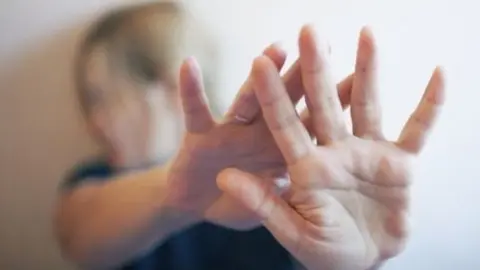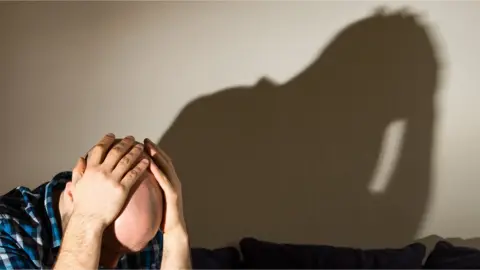Domestic abuse: Naomi Long says victims can have confidence in new laws
 Getty Images
Getty ImagesNew domestic abuse laws in NI should give victims "more confidence" to report such crimes, Naomi Long has said.
The justice minister was speaking ahead of landmark legislation finishing its final legal hurdle at Stormont on Monday.
The laws have been long-awaited, after the NI Assembly's collapse in 2017 stalled the process.
It will mean coercive control becomes an offence in NI for the first time.
Coercive control includes psychological abuse and non-violent intimidation.
Mrs Long also introduced separate legislation on Monday to make stalking a specific offence in Northern Ireland.
Northern Ireland is the only part of the UK that does not have anti-stalking laws.
'No shame for victims'
The minister had intended to introduce it before Christmas, but said she was "confident" the stalking bill would make it into law before the end of the assembly mandate in 2022.
Last April, it was reported there had been three domestic killings in NI since the then lockdown came into place, but Sonya McMullan, from Women's Aid, told BBC Radio Ulster's Evening Extra programme that five people had been killed to date.
Mrs Long said she recognised the domestic abuse legislation had "taken longer than most victims would have hoped".
She said: "I hope this does lead to a change in the conversation, the law will provide a robust definition of what domestic abuse looks like.
"There is no shame for a victim of domestic abuse - it is not their fault, and I hope it will give them confidence to report because by doing so, we will have more survivors of abuse as opposed to victims." She said those who perpetrated domestic abuse could expect to face the full force of the law.
Convictions for the most serious domestic abuse offences will carry a penalty of up to 14 years in jail.
 PA
PAThe effect that domestic abuse can have on children is also reflected in the legislation, with enhanced sentences possible in cases where:
- The victim in a relationship is aged under 18
- Where a child sees, hears or is present during an incident of abuse
- Where a child is used to abuse a victim
Mrs Long said it is hoped the domestic abuse legislation will start to take effect in the "latter half" of this year, with training being rolled out across the justice sector for staff working with victims and survivors.
Louise Kennedy of Victim Support NI described the progress of the new laws as a "very good thing for victims of crime".
The provisions dealing with coercive control were important to outlaw "unacceptable behaviour", she added.
"Any victim of abuse will tell you this is not just a few unkind words - this is a systematic pattern of psychological attack on a person to rob them of self-esteem, isolate them from friends and family, restrict their freedoms, restrict their access to money or threaten violence to make sure they stay subordinate," she added.
Ms Kennedy said the protection against stalking bill would "shine a light" to show that anyone can be affected by it.
Sonya McMullan, from Women's Aid, said the problem can persist beyond the end of an abusive relationship.
"Domestic violence does not end at that point of separation and often the risk is heightened," she said.
"We have to remember the five women that have lost their lives from March of last year where there's been a domestically motivated homicide, that's a really important factor," she added.
If you have been affected by any of the issues in this article, there are a list of organisations that may be able to help at BBC Action Line